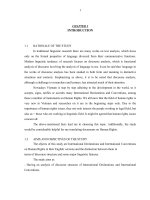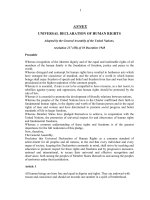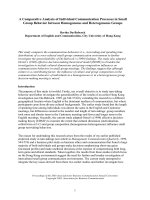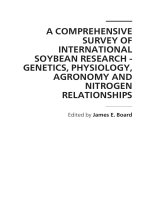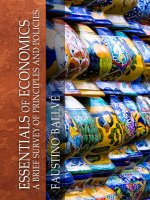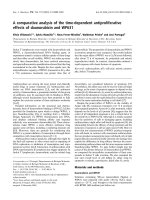A comparative survey of buddhist and western critiques of metaphysics
Bạn đang xem bản rút gọn của tài liệu. Xem và tải ngay bản đầy đủ của tài liệu tại đây (582.24 KB, 124 trang )
A COMPARATIVE SURVEY OF BUDDHIST AND
WESTERN CRITIQUES OF METAPHYSICS
THALAWATHUGODA NIGRODHA THERO
(BA (Hons.), UOK)
A THESIS SUBMITTED
FOR THE DEGREE OF MASTER OF ARTS
DEPARTMENT OF PHILOSOPHY
NATIONAL UNIVERSITY OF SINGAPORE
2007
i
ACKNOWLEDGEMENTS
I am grateful to all who contributed to the successful conclusion of this thesis.
First among them is my supervisor, Associate Professor Saranindra Nath Tagore,
whose immense criticism and timely response proved invaluable. I am also
indebted to all my friends and colleagues who in one way or another assisted me
in the course of this research. They include: Rona, Wilson, Kim, Ola, Bendick,
Charlene, Kevin and Jason.
Finally, I express my unalloyed gratitude to my parents and teachers for their
kindness and care.
ii
TABLE OF CONTENTS
Acknowledgements i
Table of Contents ii
Summary iv
CHAPTER ONE
1.0 Introduction 1
1.1 Metaphysics: Towards a Definition 1
1.2 Aim of Research 4
1.3 Significance of Research 6
1.4 Structure and Description of Research 6
CHAPTER TWO
2.0 Western Critics of Metaphysics 11
2.1 Hume’s Criticism of Metaphysics 11
2.2 Kantian Criticism of Metaphysics 23
2.3 Logical Positivism and Metaphysics 38
2.3.1 A. J. Ayer 41
2.4 Theoretical Frameworks of the Western Critics 49
CHAPTER THREE
3.0 Buddhism and Metaphysics 54
3.1 Buddhist Attitude towards Metaphysics in General 56
3.2 Buddhism on the World 60
3.3 Buddhism on God 68
iii
3.4 Buddhism on the Soul 76
3.5 Theoretical Frameworks of Buddhist Anti-Metaphysical Teachings 85
CHAPTER FOUR
4.0 A Comparison of Western Critiques with Buddhism 88
4.1 Buddhism and Hume 88
4.2 Buddhism and Kant 100
4.3 Buddhism and Logical Positivism 107
CONCLUSION 113
BIBLIOGRAPHY 115
iv
SUMMARY
Metaphysics of stasis affirms the existence of unchangeable independent entities. In this
sense of metaphysics, early Buddhist philosophy is anti-metaphysical. It does not affirm
the existence of metaphysical entities like God, the soul and substance that underlie the
world. This negative attitude towards metaphysics of stasis can be explained within the
larger context of the goal of Buddhism. The major aim of Buddhism is to eliminate
suffering in all its shades and to enable individuals attain nirvana. This attempt to
eliminate suffering goes a long way towards eliminating metaphysical thinking pertaining
to unchangeable entities, since such reasoning, on its own, can open a path that leads to
suffering. Suffering must be averted both in theory and practice. Buddhism in
furtherance of this mission to eliminate suffering advocates a certification attitude to
knowledge. Such attitude leads it to empiricism.
Buddhism also teaches an ethical theory and a doctrine of change which are all geared
towards achieving its goal. These concepts of change and ethics give Buddhism a
framework to argue against unchangeable metaphysical concepts; it also attributes the
adherence to such concepts to ignorance, which in turn serves as a hindrance to the
ethical life.
A review of western philosophy also shows that metaphysics of stasis has many critics.
Prominent among the critics are David Hume, Immanuel Kant and a group of
philosophers called Logical Positivists of which A.J.Ayer is one. David Hume, a strong
v
adherent of the empiricist school, criticized metaphysics of stasis from his empirical
perspective, while Immanuel Kant, whose philosophy emerged as an attempt to reconcile
rationalism and empiricism, excluded it based on apriori categories of sensibility.
Metaphysical conclusions pertaining to unchangeable entities, in his perspective, are
products of erroneous judgements of reason. Ayer and the logical positivists with their
insistence on verification, both in principle and actuality, exclude such reasoning as
nonsensical.
A comparative survey of both Buddhist critiques and western critiques of metaphysics,
with reference to God, the world and the soul shows that there are similarities and
differences in both thoughts. Their similarities go a long way to show that they can
dialogue with each other and such similarities provide a strong avenue for a continuous
philosophical dialogue between the East and West.
1
CHAPTER ONE
1.0 INTRODUCTION
1.1 METAPHYSICS: TOWARDS A DEFINITION
According to an often repeated story, which apparently first arose in the sixteen century,
Andronicus of Rhodes, who edited the works of Aristotle in the first century BC, was the
first to use the word “metaphysics.” He coined the term to describe his placement of
Aristotle’s work on first philosophy “after the physics.” Aristotle himself described the
subject of his treatise as the science of Being as such, a supremely general study of
existence or reality distinct from any of the special sciences and more fundamental than
them. He argued that there must be such a science, since each of the special sciences,
besides having its own peculiar subject matter, made use in common with all others of
certain quite general notions, such as those of identity and difference, unity and plurality.
Such common notions as these would provide the topics of the general science of being,
while various different kinds of existence or reality, each with its own peculiar features
provide the subject matter of the more departmental studies.
1
Many authors follow this Aristotelian step of defining metaphysics as the science of
Being. However, as Blackburn pointed out, this can be misleading, for there may be
nothing or little to be said about Being as such. “But what is right in the idea that
1
H.P Grice et al “Metaphysics” in The Nature of Metaphysics, (London: Macmillan, New York: St
Martin’s, 1957) p.1-2.
2
metaphysics is the science of Being is that most abstract study in this abstract discipline
concerns the broad nature of reality, and the possibility of its objective representation.”
2
Other thinkers have also tried to define metaphysics in their own words. Alexander
Baumgarten’s Metaphysics, a popular text book, which Kant used in his courses, defined
metaphysics as “the science of the first principles in human cognition.”
3
Bradley on his
own holds that “Metaphysics[is] an attempt to know reality as against mere appearance,
or the study of first principles or ultimate truths, or again the effort to comprehend the
universe, not simply piecemeal or by fragments, but somehow as a whole.”
4
William
Carter defines it from a narrow sense as “a field of inquiry that focuses attention upon
philosophical issues concerning the general nature and structure of the world we
inhabit.”
5
From the foregoing, it should be noted that metaphysics, in its minimal form, is the act of
categorical description. Its subject matter is the most fundamental aspects of the way we
talk and think about reality, the most fundamental features of reality as it presents itself to
us. Reality then can be thought of or talked about in different ways. However, in this
thesis, I will talk about reality from a transcendental perspective.
Transcendental, here, refers to unobservable principles or entities. For instance, when we
say that something is green or bitter or hard, we can point to certain definite types of
2
Simon Blackburn, ibid.
3
Cf. Kant, Prolegomena to Any Future Metaphysics, (Cambridge: Cambridge University Press, 1997)
p.xvii
4
Cf. H.P Grice et al, op.cit. ,p.2.
5
William R. Carter, The Elements of Metaphysics, (Philadelphia: Temple University Press, 1990) p.2.
3
experience to which we refer by these words. If one does not know the meaning of black,
I can always point, for instance, to a cup and say that it is of the colour that I mean. But to
what, people ask, can we point to identify God or the soul? Therefore, the term
metaphysics in this thesis refers to transcendental metaphysics. Transcendental
metaphysics in itself refers to many concepts, like that of evil, time, space etc. However,
for this thesis, I will focus on the transcendental metaphysics of stasis, that is,
metaphysics with regard to unchangeable entities like the soul, the world (origin and
substance) and God. Metaphysics in this thesis will therefore be construed as the
metaphysics of stasis. However, this does not exhaust the idea of transcendental
metaphysics or metaphysics in general.
Metaphysicians do not just assert their positions. They attempt to support them by
arguments and give proofs of their conclusions. Some consideration of these proofs must
form part of any enquiry into the nature of metaphysics; for it is the attempt to give a
proof for his conclusion, to show by logical argument that such-and-such must be so, that
chiefly distinguishes the philosophical metaphysician from the mystic, the moralist and
others who express or try to express a comprehensive view of how things are or ought to
be.
All theorists employ arguments and make inferences, for all are concerned to get from
one place to another, move from a set of premises or collection of facts to a conclusion.
However, not all theorists make the same kind of inferences, and a movement from
premises to conclusion can be made according to very different sorts of rules. For
4
instance, while some theorists may prefer inductive arguments, others use deductive ones.
These theorists can be found in the whole era of western philosophy ranging from the
ancient era down to the modern and contemporary period.
In the ancient era, Plato and Aristotle can be seen as the great champions of metaphysics.
Plato, on the one hand, advanced a doctrine of forms. In this doctrine, the eternal form is
seen as the archetype of things in this created word. Aristotle, on the other hand,
championed the idea of being qua being, substance and uncaused cause. The medieval era
on its own saw philosophers like Augustine and Aquinas championing the idea of
metaphysics. Being Christians, they promoted a metaphysics based on the transcendental
idea of God. The modern history of metaphysics had some metaphysicians too.
Prominent among them were Spinoza and Leibniz. Spinoza promoted the idea of
substance while Leibniz that of monads.
1.2 AIM OF RESEARCH
All in all, these philosophers and some others following them accepted the idea of
metaphysics without questioning it. They sought to build their philosophy based on these
assumed and accepted metaphysical groundings. However, during the seventeenth
century, metaphysics came under heavy attack from some notable philosophers. It is here
that the major aim of this thesis comes into play. The major aim of this thesis then is to
review the major criticisms of these philosophers against metaphysics, as construed in
this research, with special reference to the world, God and the soul, with the aim of
5
making a comparative study of them with the Early-Buddhist anti-stand of transcendental
metaphysics.
6
Buddhist philosophy, though not a direct attack on some western metaphysical
philosophers I mentioned earlier, in its teaching can be said to be anti metaphysics, akin
to that of the western critics. I am seeking, therefore, to review, on the one hand, the
criticisms of the western philosophers, and, on the other hand, arguments and positions of
Buddhism which bear the same criticism on metaphysics. The whole aim is then to know
if there can be a convergence and at the same time a divergence. From this perspective,
then, the extent to which Buddhism is anti metaphysics akin to the western critics will be
brought out, and the extent which it is not will also be shown.
In making a comparative study, I understand that Hume and Ayer do not subscribe to
Metaphysics in the general sense of it as compared to either Kant or Buddhism, who may
have shades of metaphysics in their thoughts. Therefore, my comparison does not aim to
say whether the western critics are metaphysicians or not in their own right, or to claim
that Buddhism does not subscribe to any kind of metaphysics. rather, the aim as I stated
earlier is to compare their criticisms on a particular kind of metaphysics, namely that of
stasis.
6
Early Buddhism is also referred to by many scholars as Pali or Theravada Buddhism. Henceforth, all
reference to Buddhism must be construed as Early or Pali Buddhism.
6
1.3 SIGNIFICANCE OF RESEARCH
The significance of this research is to promote an inter-philosophical dialogue between
the east and west, by bringing out common grounds on which such a dialogue can begin.
This research provides both a unity and diversity of thoughts. This thesis will help
identify the strength and weakness of the other and thus open a way for
complementarities of ideas.
1.4 STRUCTURE AND DESCRIPTION OF RESEARCH
This research work is structured into four chapters. The first chapter takes a clarificatory
role. Here, I try to unpack the concept of metaphysics, its use and purpose. I have
therefore brought up some definitions by different authors to make clear the general sense
of metaphysics. I have also indicated the construal of metaphysics in this research as that
of unchangeable realities with independent existence (metaphysics of stasis).
Chapter two takes up a historical review of the notable critics of western metaphysics. In
this chapter I discuss the ideas of David Hume, Immanuel Kant and A.J Ayer, a Logical
Positivist. I start off with Hume, who criticized metaphysics from an epistemological and
psychological stand. Hume is notably an empiricist and having an empiricist world view.
He asserted that objects of human reasoning can either be that of matters of facts or
relations of ideas. The world is made up of matters of facts and relations of ideas.
Therefore, either reasoning is about a matter of fact or it is a relation of an idea based on
matters of fact. If any concept or idea does not correspond to any of these, then it cannot
said to be alluding to reality, rather an act of the imagination. Hume used this empiricist
7
stand point to criticize all ideas about substance and primordial forms. He went further to
deny any idea that connects matters of fact with an unseen cause. Causal connection then
is nothing but a matter of association between ideas of the mind.
Hume also denies the existence of God. He however cited human reason and its pattern of
association of ideas as the cause for the postulation of the idea of God. Hume also thinks
that the soul is a psychological postulate, a bundle of perceptions. Man’s delusion in
accepting the claim that some perceptions endure leads him to affirm the existence of a
soul which is perpetual. Hume says that the affirmation of a soul makes no sense since
when perception temporarily ceases man is said to be temporarily dead such as when he
or she is asleep.
After reviewing David Hume, I move on to Immanuel Kant. Kantian criticism came from
his understanding of human knowledge and how it comes about. Human knowledge,
Kant holds, is a product of the mind; however, it is not formed by the mind alone
independent of the external world. The external world supplies the content while the
mind supplies the categories through which the external world is known. It follows that
the external world can only be known based on the structure of the mind which provides
the adequate tools for knowledge. Kant, along this line of reasoning, holds that the mind,
in its first power of sensibility—where knowledge begins, has the categories of time and
space. These categories, coupled with those of the understanding, are applied on objects
of the external world in churning out knowledge. Since real knowledge must conform to
the categories of the mind, any purported knowledge which does not conform, at least, to
8
the categories of sensibility namely time and space cannot be said to be knowledge in the
actual sense.
Following this kind of reasoning then, all knowledge claims to the transcendent
metaphysics of stasis, namely God, the soul and substance which are not within time and
space cannot pass for genuine or real knowledge. Kant holds that they cannot be known.
However, he sets them aside as the erroneous judgments of reason. Reason can make
erroneous judgements based on the deception of the imagination when it wanders on its
own to the timeless and spaceless domains and encounter the idea of God, the soul and of
substance.
After reviewing Kant, I went on to look at A.J Ayer, a member of the Logical Positivist’s
movement and his arguments against metaphysics, with which I conclude chapter two.
Ayer and the logical positivists can be said to be the people who gave metaphysics a
heavy blow. Their philosophy hinges on their verification principle. The verification
principle is a principle that upholds as knowledge anything or idea that can be
experimented or falls under a system whose rules are conventionally formulated. With
the verification principle, all metaphysical concepts fall out of the realm of knowledge
since they cannot be experimentally verified even in theory. The Logical Positivists
specifically described metaphysical concepts as nonsensical.
Chapter three is a comprehensive review of the Buddhist view on metaphysics. I start
with a brief historical excursus on the origin of Buddhism, namely from the history of the
9
Buddha. For the purpose of this research, I specifically discuss the Buddhist conception
of the world, God and the soul. These conceptions are anti-metaphysical in the sense that
they do not accept any higher or non-empirical existence of the world, God and the soul.
Concerning the world, Buddhism is mute on its ultimate beginning or its teleology. The
idea of substance is not accepted in the Buddhist’s conception of the world. Buddhism
sees the world as something in a state of flux, the arising and falling away of the
Paramattha dhammas. Nama and Rupa are the major Paramattha dhammas that arise
and at the same time fall.
On the issue of God, Buddhism does not possess any theology and hence does not
conceive of any absolute being or a metaphysical deity who is the cause of the universe.
It also rejects the idea of an imagined God who can be used to regulate men’s conduct.
However, as I point out, Buddhism makes mention of gods, not in the sense of
unchangeable supernatural entities, but in the sense of their physical qualities.
Having discussed the issue of God and the world, I focus on the metaphysical concept of
the soul. Buddhism explicitly denies the idea of the soul in the concept of Annata.
Buddhism and its cosmology being empirical in nature, examines the human person from
the empirical perspective. From this perspective, the idea of the soul does not fit any part
of the human person. Buddhism holds that if there is a soul, it should be autonomous, but
since there is nothing in the human person that is so autonomous, then the soul does not
exist.
10
In chapter four, which is the last chapter of this thesis, I delve into the comparison of the
previous reviews made in chapters two and three, namely the western critics of
metaphysics and the Buddhist critiques of metaphysics. In comparing them, I brought out
their convergence where they exist and their divergence too. In this comparison, I start
with David Hume. After the comparison of Buddhism and Hume, I also compare
Buddhism and Kant. Finally, I compare Buddhism with A. J. Ayer and the logical
positivists. I then sum up the thesis with a brief conclusion.
11
CHAPTER TWO
2.0 WESTERN CRITICS OF METAPHYSICS
As I mentioned earlier, Metaphysics, as construed in this research, has never gone
unchallenged from western philosophers, its strongest critics coming from the
seventeenth century down to the contemporary era. There are many critics of
metaphysics. However, for the purpose of this thesis I will limit myself to three
philosophers, namely, David Hume, Immanuel Kant and A. J. Ayer. I will take a closer
look at their criticisms and the arguments against metaphysics with reference to the idea
of God, the world and the soul.
2.1 HUME’S CRITICISM OF METAPHYSICS
David Hume (1711-76) is without doubt one of the greatest philosophers to write in
English. The range of his work is wide, but he is best known today for his views on
causation, induction, perception, personal identity and on the nature of morality. His
major works include: A Treatise on Human Nature, Essays, Moral, Political and
Literary, Enquiry Concerning Human Understanding, and Enquiry Concerning the
Principles of Morals. Hume’s criticism of metaphysics stems from his empiricist
background. Therefore, to understand his criticism, one must look at it from the point of
view of his empiricism. The basic thesis of empiricism is that legitimate human
knowledge arises from what is provided to the mind by the senses. It is distinguished
from the philosophical tradition of rationalism, which holds that human reason apart from
12
experience is a basis for some kinds of knowledge. In other words, empiricism is the
doctrine that all our knowledge is derived from experience.
Hume affirmed that all the objects of human reason or enquiry may be divided into two,
namely relations of ideas and matters of facts. Of the first kind are the sciences of
geometry, Algebra and Arithmetic and in short, every affirmation that is either intuitively
or demonstratively certain. Matters of facts, which are the second objects of human
reason, are not ascertained in the same manner, nor is our evidence of their truth.
7
Hume
did not deem it fit to question the judgements that uphold the existence of matters of
facts; rather he took it for granted that there exist matters of facts and went on to question
why we believed in the existence of bodies. In the Treatise, he wrote “we may ask, what
causes induce us to believe in the existence of body? But’ tis in vain to ask, whether there
be a body or not? That is a point, which we must take for granted in all our reasonings.”
8
In what sense then, we may ask Hume, is it in vain to ask whether there be body or not?
The obvious interpretation is that whether we like it or not, we all do as a matter of fact
believe that there is a material world, even though we can give no good reason for our
belief. An earlier remark by Hume in the Treatise supports this belief. He said that
“nature has not left this to his [the sceptic’s] choice, and has doubtless esteem’d it an
affair of too great importance to be trusted to our uncertain reasonings and speculations.”
9
7
David Hume, An Enquiry Concerning Human Understanding, (New York: Dover Publications,
2004) p.14.
8
David Hume, A Treatise on Human Nature Bk 1, (Oxford: Claredon, 1951) p.187.
9
Ibid.
13
Hume maintained that our reasoning on matters of fact seems to be based on our idea of
causation. And from there we deduce all other arguments that justify the existence of
other realities that are not within the purview of our senses. He said:
All reasonings concerning matter of fact seem to be founded on the
relation of Cause and Effect. By means of that relation alone we
can go beyond the evidence of our memory and senses. If you were
to ask a man why he believes any matter of fact, which is absent;
for instance that his friend is in the country, or in France; he would
give you a reason; and this reason will be some other fact; as a
letter received from him, or the knowledge of his former
resolutions and promises. A man finding a watch or any other
machine in a desert island would conclude that there had once been
men in that island. All our reasonings concerning fact are of the
same nature.
10
However, Hume maintained that our seeming causal reason is a part of human nature and
was acquired through experience. He said that “as a general proposition, which admits
of no exception, that the knowledge of this relation is not, in any instance, attained by
reasonings a priori; but arises entirely from experience.”
11
With these sentences, Hume
dealt a heavy blow to all the causal arguments from ancient, medieval and modern era
10
Hume, An Enquiry, op.cit., p. 15.
11
Ibid.
14
that opine the existence of God or a substance that cannot be experienced from the
existence of matters of facts. It then means that without experiencing substance or God,
their existence is nothing but an arbitrary conjecture. Hume actually affirmed this saying:
In a word, then, every effect is a distinct event from its cause. It
could not, therefore, be discovered in the cause, and the first
invention or conception of it, a priori, must be entirely arbitrary.
And even after it is suggested, the conjunction of it with the cause
must appear equally arbitrary ….In vain, therefore, should we
pretend to determine any single event, or infer any cause or effect,
without the assistance of observation and experience.
12
Hume believed that human reason has the capacity to reduce the principles productive
of natural phenomena to a greater simplicity, and to resolve the many particular effects
into a few general causes, by means of reasoning from analogy, experiences and
observation. He asserted that “the causes of these general causes, we should in vain
attempt their discovery; nor shall we be able to satisfy ourselves, by any particular
explication of them.”
13
From this assertion then all a priori reasoning on the immutable
foundations of the world, be it the Platonic forms, or the Aristotelian Being qua being or
the monads of Leibnitz, becomes mere acts of the imagination. Hume actually said that
nothing is more free than the imagination, though it cannot exceed the original ideas
12
Ibid., p. 17.
13
Ibid.
15
furnished by sensation, either from the internal or external senses. It has unlimited power
of mixing and compounding ideas in all varieties of fiction and vision.
14
Having denied the idea of causation, Hume renders superfluous all the arguments that
prove the existence of God through a causal link from God the creator to the world. He
believes that humanity always look for ways to account for the more common operations
of nature like the descent of heavy bodies, the growth of plants, the generation of
animals, or the nourishment of bodies by food. He holds that by this act of humanity, we
tend to acquire, by long habit, such turn of mind, that upon the appearance of the cause,
there is an assurance of a corresponding effect, and it is hardly to be conceived that any
other event could result from the said cause.
15
However, he says:
It is only on discovery of extraordinary phenomena, such as
earthquake, pestilence, and prodigies of any kind, that they find
themselves, at a loss to assign a proper cause, and to explain the
manner in which the effect is produced by it. It is usual for men, in
such difficulties, to have recourse to some invisible intelligent
principle as the immediate cause of that event which surprises
14
Ibid., p.8-9.
15
Ibid., p.44.
16
them, and which, they think, cannot be accounted for from the
common powers of nature.
16
Hume here argues that the sense of awe and our ignorance makes us attribute the cause of
certain things to God—God being our refuge and our acknowledgement of helplessness
in the face of certain events. God becomes the augmentation of our mind and capacity.
He asserts that “the idea of God, as meaning an infinitely intelligent, wise, and good
Being, arises from reflecting on the operations of our mind, and augmenting, without
limit, those qualities of goodness and wisdom.”
17
This augmentation, according to
Hume, can sometimes be extended to the internal operations of the mind itself, whereby
we now think that our mental vision or conception of ideas is nothing but a revelation
made to us by our maker.
By describing our thoughts as the work of the creator then, when we turn our thoughts
to any object and construct its image in our fancy, we then attribute the idea to a universal
creator who discovers it and renders it to the mind. By doing this, we render the universe
full of God and every act an act of God. In a critique specifically turned to Spinoza and
pantheistic philosophers of his kind, Hume says:
Thus according to these philosophers, every thing is full of God.
Not content with the principle that nothing exists but by his will,
that nothing possesses any power but by his concession: they rob
16
Ibid., p. 44.
17
Ibid., p.10.
17
nature, and all created beings, of every power, in order to render
their dependence on the Deity still more sensible and immediate.
They consider not that, by this theory, they diminish, instead of
magnifying, the grandeur of those attributes, which they affect so
much to celebrate. It argues surely more power in the Deity to
delegate a certain degree of power to inferior creatures than to
produce everything by his own immediate volition. It argues more
wisdom to contrive at first the fabric of the world with such perfect
foresight that,of itself, and by its proper operation, it may serve all
the puposes of providence, than if the great Creator were obliged
every moment to adjust its parts, and animate by his breath all the
wheels of that stupendous machine.
18
Hume argues that this pantheistic view and the attribution of universal energy and
operation to a supreme being are too bold to carry any conviction with them. Our human
reason being narrow and limited will suspect that the arguments for the Supreme Being
have stretched us beyond the limits of our faculties, despite the fact that the arguments
may be logical. In the argument for the existence of the Supreme Being, the intellect has
wandered into a fairy land where it leads to conclusions so extraordinary and so remote
from common life and experience. Hume, therefore, concludes that we have no idea of
the Supreme Being but what we learnt from reflection of our own faculties.
18
Ibid., p.45
18
In the Dialogues Concerning Natural Religion, Hume proffers another argument against
the existence of God, namely from the existence of evil. Hume’s character, Philo, argues
that the enormous amount of human and animal suffering provides good reason for
believing that God does not exist. In his reply to Demea who suggested that each man
feels the truth of religion within his own breast, Philo said “I am indeed persuaded that
the best and indeed the only method of bringing every one to a due sense of religion, is
by just representation of the misery and wickedness of men.”
19
As the discussion went
on, Philo said:
Observe too the curios artifice of nature, in order to [e]mbitter the
life of every living being. The stronger prey upon the weaker, and
keep them in perpetual terror and anxiety. The weaker too, in their
turn, often prey upon the stronger, and vex and molest them
without relaxation. Consider that innumerable race of insects,
which either are bred on the body of each animal, or flying about
inflix their stings in him. These insects still have others still less
than themselves which torment them. And thus on each hand,
before and behind, above and below, every animal is surrounded
with enemies, which incessantly seek his misery and
d[e]struction.
20
19
Hume, Dialogues Concerning Natural Religion, in the Treatise, op.cit., p. 435.
20
Ibid.,p.436.
19
Demea, however, sought to call Philo’s attention that Man is the animal that is an
exception, since by combination in society, he can easily master lions, tigers, and bears
whose greater strength and agility naturally enable them to prey upon him. But Philo
refuted him, saying that:
On the contrary, it is here that the uniform and equal maxims of
nature are most apparent. Man, it is true, by combination, surmount
all his real enemies, and become master of the whole animal
creation: but does he not immediately raise up to himself
imaginary enemies, the demons of his fancy, who haunt him with
superstitious terrors, becomes in their eyes, a crime: his food and
repose give them umbrage and offence: his very sleep and dreams
furnish new materials to anxious fear: and even death, his refuge
from every other ill, presents only the dread of endless and
innumerable woes. Nor does the wolf molest more the timid flock,
than superstition does the anxious breast of wretched mortals.
21
Beside the evil of superstition, Hume also mentioned that man is the greatest enemy of
his own kind. He uses oppression, injustice, contempt, violence, sedition, war and a host
of other evil to torment one another. Cleanthes, another interlocutor, drew Philo’s
attention to the fact that there are opposite phenomena of greater importance to all the
evil he mentioned. Pleasures also abound in the universe. But Philo will not be
persuaded. He maintained that it is never possible to prove that animal or at least human
happiness in this life exceeds its misery. He also emphasized that an intermixture of good
21
Ibid.,p. 437.

